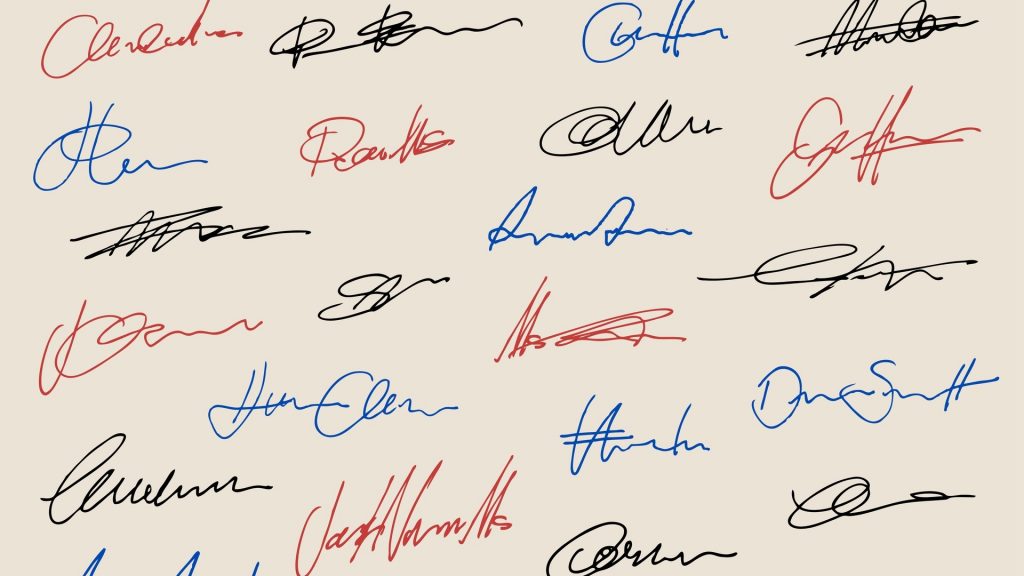Sign here: What your signature reveals about your self-esteem

Your signature is a quick flick of ink that you repeat without thinking, but it could reveal how you see yourself. Researchers say that the size, shape and even direction of your handwriting may be connected to personality traits like confidence and narcissism.
Fast Company recently highlighted decades of research showing that the amount of space a person takes up when signing their name can reflect how they see their own status.
From self-esteem to status awareness
The idea goes back to 1967, when social psychologist Richie Zweigenhaft, now an emeritus professor at Guilford College, studied the signatures of faculty, students and staff at Wesleyan University. He noticed that professors tended to use more space when signing books out of the library, while students used smaller signatures.
His follow-up studies found signature size increased with both age and professional rank. Zweigenhaft coined the term “status awareness,” suggesting that people in higher positions tend to express that visually, even in their handwriting.
Years later, University of Maryland researcher Nick Seybert explored whether larger signatures might also reflect narcissism. In controlled studies, both Seybert and Zweigenhaft found a significant positive correlation between signature size and narcissism scores. The finding held true across multiple countries, including the United States, Germany, Iran, South Africa and China.
Later studies applied the same analysis to CEOs and CFOs. By 2020, the Journal of Management recognized signature size as 1 of 5 accepted indicators of narcissistic tendencies among corporate leaders.
Big signatures, big personalities
The research gained fresh attention through Fast Company, which used President Donald Trump’s bold, spiked signature as a modern example. The president has even commented on it before, admiring his signature and saying, “Everyone loves my signature.”
The New York Times recently analyzed how Trump’s signature has evolved over the years — from a 1998 letter written to Rudy Giuliani to a 2003 inscription in Jeffrey Epstein’s birthday book. During those years, his signature had a long tail at the end as compared to his current, more angular signature.
Some experts say the evolution reflects growing dominance and control tendencies in his personality. Meanwhile, Science of People highlights that embellishments, such as hearts or long lines at the end, can show persistence and creativity.
Handwriting habits that hint at personality
Outside of politics, researchers have looked at the signatures of famous leaders, like Bill Gates and Tim Cook, noting similar correlations between bold signatures and executive confidence.
Science of People adds that specific handwriting traits can also reveal other personality markers. A rising signature, where the baseline ascends, may indicate optimism. A descending one can suggest discouragement or fatigue. Straight signatures are linked to balance and control.
Unbiased. Straight Facts.TM
George Washington’s personal copy of the U.S. Constitution and Bill of Rights set a record in 2012 after being sold for $9.8 million at an auction.

Legibility matters too. A clear signature often reflects straightforwardness, while a more abstract or illegible one may suggest privacy or guardedness.
When signatures become collectors’ items
Signature analysis isn’t limited to psychology; it’s also a booming part of the memorabilia market.
The Raab Collection, which buys and sells historical autographs, notes that autograph collecting didn’t take off in the U.S. until 1815, with the assistance of biographer William B. Sprague. They trace the concept back even further to Aristotle, who was known to sign his works.
In one example, a 1983 letter signed by Apple cofounder Steve Jobs recently sold at R.R. Auction for nearly $478,000. Jobs had written the letter to a fan who had simply asked for his autograph, in which he responded, “I’m afraid I don’t sign autographs,” but signed the letter.
So what does all this mean for your own signature?
It may not be a scientific diagnosis, but experts say it’s a reliable behavioral cue — a small but telling clue about your sense of self. Signature size, slope and legibility can reveal confidence or even leadership potential.
The post Sign here: What your signature reveals about your self-esteem appeared first on Straight Arrow News.





